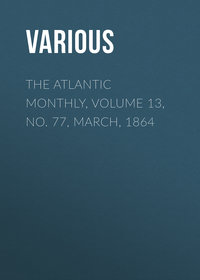Kitabı oku: «The Atlantic Monthly, Volume 13, No. 77, March, 1864», sayfa 18
We cordially indorse what is said of those harpy-defilers of knowledge known as juvenile books. A limited use of the works of Abbott, Edgeworth, Sedgwick, and a very few others may certainly be permitted. But the common practice of removing every occasion for effort from the path of the young—of boning and spicing the mental aliment of our fathers for the palates of our sons—would be a ridiculous folly, if it were not a grievous one. Suitable reading for an average boy of ten years may be found in the best authors. For it is well observed by Dr. Ray, that, if the lad does not perceive the full significance of Shakspeare's thoughts or the deepest harmony of Spenser's verse, if he does not wholly appreciate the keen sagacity of Gibbon or the quiet charm of Prescott, he will, nevertheless, catch glimpses of the higher upper sphere in which a poet moves, and fix in his mind lasting images of purity and loveliness, or he will learn on good authority the facts of history, and feel somewhat of its grandeur and dignity. To the sort of reading which naturally succeeds the Peter-Parley dilutions of wisdom we can only allude to thank Dr. Ray for speaking so clearly and to the point.
But it becomes necessary to pass over many pages which we had marked for approving comment. In conclusion it may be said that this treatise on Mental Hygiene is full of wholesome rebukes and valuable suggestions. Yet the impression of New-England, or even of American life, which a stranger might receive from it, would be lamentably false. In a special department, Dr. Ray is an able scientist. To a wide-embracing philosophy he does not always show claims. There has been heart-sickening corruption in all prosperous societies,—especially in such as have been debauched by complicity with Slavery. It is the duty of some men of science and benevolence to be ever probing among the defilements of our fallen nature, to breathe the tainted air of the lazar-house, to consort with madness and crime. Few men deserve our respect and gratitude like these. But let them be cheered by remembering that in the great world outside the hospital there are still elements of worthiness and nobility. Wealth was never more wisely liberal, talents were never held to stricter accountability, genius has never been more united with pure and high aims, than in the Loyal States to-day. The descendants of "those much-enduring men and women of colonial times" have not shown themselves altogether "incapable of toil and exposure." From offices and counting-rooms, from libraries and laboratories, our young men have gone forth to service as arduous as that which tried their fore-fathers. How many of them have borne every hardship and privation of war, every cruelty of filthy prisons and carrion-food, yet have breasted the slave-masters' treason till its bullet struck the pulse of life! Let us remember that the most divergent tendencies of character, even such as we cannot associate with an ideal poise of mind, may work to worthiest ends in this ill-balanced world of humanity. The saying of Novalis, that health is interesting only in a scientific point of view, disease being necessary to individualization, shows one side of the shield of which Dr. Ray presents the other.
RECENT AMERICAN PUBLICATIONS
RECEIVED BY THE EDITORS OF THE ATLANTIC MONTHLY
The Life of Philidor, Musician and Chess-Player. By George Allen, Greek Professor in the University of Pennsylvania. With a Supplementary Essay on Philidor as Chess-Author and Chess-Player, by Tassilo von Heydebrand und der Lasa, Envoy Extraordinary and Minister Plenipotentiary of the King of Prussia at the Court of Saxe-Weimar. Philadelphia. E. H. Butler & Co. 12mo. pp. xii., 156. $1.50.
Spots on the Sun; or, The Plumb-Line Papers. Being a Series of Essays, or Critical Examinations of Difficult Passages of Scripture; together with a Careful Inquiry into Certain Dogmas of the Church. By Rev. T. M. Hopkins, A. M., Geneva, N. Y. Auburn. William J. Moses. 16mo. pp. 367. $1.00.
Frank Warrington. By the Author of "Rutledge." New York. G. W. Carleton. 12mo. pp. 478. $1.50.
Husband and Wife; or, The Science of Human Development through Inherited Tendencies. By the Author of "The Parent's Guide," etc. New York. G. W. Carleton. 12mo. pp. 259. $1.25.
Sermons preached before His Royal Highness the Prince of Wales, during his Tour in the East, in the Spring of 1862, with Notices of some of the Localities visited. By Arthur Penrhyn Stanley, D. D., Regius Professor of Ecclesiastical History in the University of Oxford, Honorary Chaplain in Ordinary to the Queen, etc., etc. New York. C. Scribner. 12mo. pp. 272. $1.50.
Palmoni; or, The Numerals of Scripture a Proof of Inspiration. A Free Inquiry. By M. Mahan, D. D., St. Marks-in-the-Bowery Professor of Ecclesiastical History in the General Theological Seminary. New York. D. Appleton & Co. 12mo. pp. 176. 75 cts.
